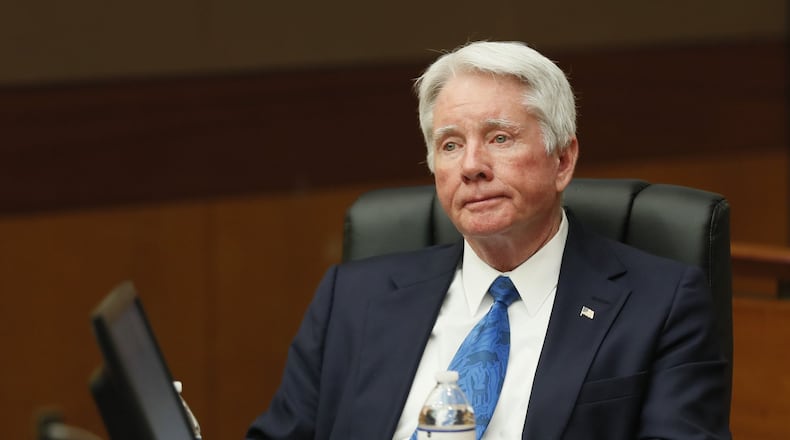The jury in the Claude “Tex” McIver case was improperly denied the right to decide whether the former Atlanta lawyer committed a misdemeanor when he fatally shot his wife, his lawyer argued Wednesday.
Because of that, McIver’s murder conviction should be overturned and he should be granted a new trial, defense attorney Don Samuel told the Georgia Supreme Court.
This marked the second appeal of a high-profile murder before the court this week. On Tuesday, it heard the case against Justin Ross Harris, who left his 22-month-old son in his hot car to die. Like Harris, McIver contended what happened was an accident, but juries in both cases found the men’s acts to be intentional and convicted them of murder.
On Sept. 25, 2016, McIver shot his 64-year-old wife Diane in the back after their white Ford Expedition had stopped at a traffic light on Piedmont Avenue. McIver was sitting in the back seat behind Diane, who was next to her best friend, Dani Jo Carter, who was driving the SUV.
McIver, who did not call 911, directed Carter to take his wife to Emory University Hospital, where she died during surgery. McIver told police that he fell asleep while holding a handgun. He had earlier asked to be given the gun out of the center console because he thought they had driven upon a Black Lives Matter protest, according to testimony.
The fatal shot was fired shortly after Diane McIver told her husband to wake up and not fall asleep.
“There was overwhelming evidence that this was an accident,” Samuel told the justices. “Witnesses from both the prosecution and the defense were unanimous in describing their mutual affection, marital bliss.”
At trial, prosecutors successfully argued that Tex McIver had a financial motive to kill his wife and, after he shot her, tried to cover it up.
Fulton County Superior Court Judge Robert McBurney, who presided over the trial, refused a defense request to let jurors consider a charge of misdemeanor involuntary manslaughter, which carries a punishment of no more than one year in custody.
To convict McIver of this misdemeanor, the jury would have had to find he was being criminally negligent. Or, in legal parlance, that he was engaged in the commission of a lawful act performed in an unlawful manner.
At most, that is what McIver did, Samuel argued.
“He’s sleeping in a car, sitting in the back seat of a car with a gun and there’s no crime being committed,” he said. “Why do we not have the right to let the jury make that decision?”
Fulton County prosecutor Ruth Pawlak told the justices that McBurney made the right call.
“There was not even slight evidence that would have authorized that charge in this case,” she said.
Justice Michael Boggs asked Pawlak to respond to allegations that the prosecution improperly injected racial bias into the case. Specifically, Boggs referenced the closing argument by then-Fulton prosecutor Clint Rucker, who had put a list of items on a PowerPoint presentation the jury could see.
The final item, under one that read “Black Lives Matter protestors,” was “KKK,” even though there had been no mention of the Ku Klux Klan throughout the trial.
“You don’t condone that as being appropriate, do you?” Boggs asked.
Chief Justice David Nahmias expressed similar sentiments. “It’s very hard to understand why a representative of the state would have put that on the slide in a case like this,” he said.
“I can only concede that that was improper since there was no evidence that related to that,” Pawlak replied.
The court’s decision is expected in the coming months.
About the Author
Keep Reading
The Latest
Featured





